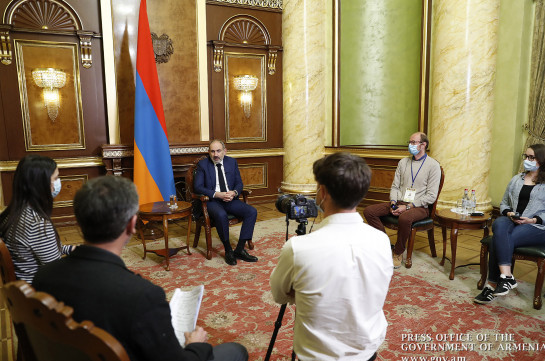
30/10/2020 17:03
Armenia’s PM on preventing the war: I could give up defending the interests of Nagorno-Karabakh and Armenia at all, but would that have prevented the war?
The situation has not really changed since 2011, because the problem is that the issue can only be resolved through compromise, Armenia’s Prime Minister Nikol Pashinyan said in an interview to The Telegraph (Great Britain), European Post (Brussels), Foreign Policy (USA), Tageblatt (Austria) and Il Giornale (Italy).
Asked whether there was anything he could have done to prevent the war, Armenia’s PM said:
“The situation has not really changed since 2011, because the problem is that the issue can only be resolved through compromise. What is the situation we have since 2011? Naturally, compromise means agreeing to something that is not at first acceptable to you, and we have had such dynamics since 2011.
What becomes acceptable to Armenia as a result of a specific concession becomes unacceptable for Azerbaijan from that moment on. And Azerbaijan expects the Armenian side, Karabakh, to make more concessions. This is the reason for the outbreak of aggression you say. Because, of course, there is a compromise, but on the one hand, we cannot afford unlimited concessions, when the other side is not prepared for a compromise just because it has more money to buy more weapons.
And I can answer your question: what else could I have done to prevent this war? I could give up defending the interests of Nagorno-Karabakh and Armenia at all. But would that have prevented the war? No, because at the lowest point of our concession Azerbaijan should have demanded more.
I recently made a parallel between the Munich Agreement and our situation. Before the outbreak of World War II, the European powers thought that by ceding Czechoslovakia to Hitler they could whet his appetite and there would be no war in Europe. And what happened as a result: Hitler swallowed Czechoslovakia and as the other saying goes, appetite is aroused when eating. If the European leaders had not surrendered the Czechoslovakia, and a war started, journalists like you would say, “Is there anything you could do better? For instance, why did you not surrender the Czechoslovakia? While the questioned leaders would say, yes, we should have been a little more flexible in the case of the Czechoslovakia. They turned out to be more flexible, and what is the outcome?”








